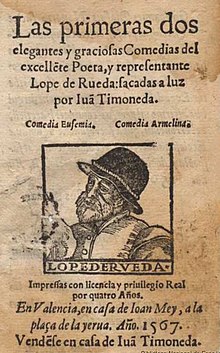Lope de Rueda
Eventually he got to be, between 1558 and 1561, manager of a strolling company which visited Segovia, Seville, Toledo, Madrid, Valencia and Córdoba.
[1] de Rueda's more ambitious plays are mostly adapted from the Italian; in Eufemia he draws on Boccaccio,[2] in Medora he utilizes Giancarli's Zingara as well as Byzantine motives, in Arinelina he combines Raineri's Attilia with Cecchi's Servigiale to create a satirical work ridiculing the superstitions current among Andalusians, and in Los Engañados (The Deceived) he uses Gl'ingannati, a comedy produced by the Intronati, a literary society at Siena - itself ultimately derived from Plautus' Menaechmi.
These follow the original so closely that they give no idea of de Rueda's talent; but in his pasos or prose interludes he displays an abundance of riotous humour, great knowledge of low life, and a most happy gift of dialogue.
Nineteen of the 26 pasos were translated into English between 1980 and 1990 by Joan Bucks Hansen, and staged by Steve Hansen and the St. George Street Players of St. Augustine,FL where they were performed nightly for five years in the city's restored Spanish Quarter; and they presented seven of the translations in 1984 at the Ninth Siglo de Oro Festival at Chamizal.
[4] He was twice married; first to actress, singer and dancer, Mariana, who had spent six years as a performer in service to the frail and infirm Don Gaston, Duke de Medinaceli, an avowed friar and cleric, whose estate was the subject of a lawsuit filed by Lope de Rueda on his wife's behalf laying claim to six years of back wages.
